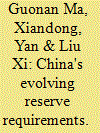| Srl | Item |
| 1 |
ID:
120840


|
|
|
|
|
| Publication |
2013.
|
| Summary/Abstract |
We examine the role of reserve requirements as a cheaper substitute for the open market operations of the People's Bank of China (PBC) to sterilise foreign exchange interventions in recent years. China's reserve requirements have also been used to address a range of other policy objectives, not least macroeconomic management, financial stability and credit policy. The preference for reserve requirements reflects the size of sterilisation and the associated costs, in a quantity-oriented monetary policy framework faced with policy dilemmas. The PBC often finds it easier to make reserve requirement adjustments than interest rate decisions and enjoys greater discretion in applying this tool. The monetary effects of reserve requirements need to be explored not in isolation but in conjunction with other policy actions. Depending on the policy mix, higher reserve requirements tend to signal a tightening bias, to squeeze excess reserves of banks, to push market interest rates higher and to help widen net interest spreads, thus tightening domestic monetary conditions. Reserve requirements, however, impose an implicit tax burden on Chinese banks, albeit the latter seem to pass through a large but incomplete portion of these costs to their customers.
|
|
|
|
|
|
|
|
|
|
|
|
|
|
|
|
| 2 |
ID:
116704


|
|
|
|
|
| Publication |
2012.
|
| Summary/Abstract |
As a member of the European Union, Greece has committed to achieve ambitious targets for the penetration of renewable energy sources (RES) in gross electricity consumption by 2020. Large scale integration of RES requires a suitable mixture of compatible generation units, in order to deal with the intermittency of wind velocity and solar irradiation. The scope of this paper is to examine the impact of large scale integration of intermittent energy sources, required to meet the 2020 RES target, on the generation expansion plan, the fuel mix and the spinning reserve requirements of the Greek electricity system. We perform hourly simulation of the intermittent RES generation to estimate residual load curves on a monthly basis, which are then inputted in a WASP-IV model of the Greek power system. We find that the decarbonisation effort, with the rapid entry of RES and the abolishment of the grandfathering of CO2 allowances, will radically transform the Greek electricity sector over the next 10 years, which has wide-reaching policy implications.
|
|
|
|
|
|
|
|
|
|
|
|
|
|
|
|